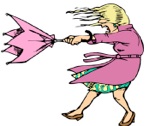



✶ ALL or NOTHING THINKING (Splitting)
You see things in black/white categories - in
absolute terms, like ‘never, always, there’s
no alternative’. If your performance falls
short of perfect, you think you’re a total
failure & ultimately leads to depression
John recently applied for a promotion in his firm. The
job went to another employee with more experience. John wanted this job badly and now believes that he will never be promoted. He feels that he is a total failure
in his career.
✶ OVER-GENERALIZATION
You take isolated cases & use them to explain
everything, seeing a single negative as a
never-ending pattern of defeat
Linda is lonely and often spends most of her time at home. Her friends sometimes ask her to come out for dinner and meet new people. Linda feels that that is it useless to try to meet people. No one really could like her. People are all mean and superficial anyway.
✶ MENTAL FILTER
You focus on specific negative or upsetting
aspects of an event, while ignoring other
positive aspects. You dwell on it exclusively,
so your vision of all reality becomes
darkened, like a drop of ink in a glass of
water
Mary is having a bad day. As she drives home, a kind
gentleman waves her to go ahead of him as she merges
into traffic. Later in her trip, another driver cuts her off.
She grumbles to herself that there are nothing but rude
and insensitive people in her city.
✶ DISQUALIFYING the POSITIVE
You continually re-emphasize or shoot down
positive experiences, rejecting the positive
ones by insisting they don’t count, for some
arbitrary reason that you’ve decided on
Rhonda just had her portrait made. Her friend tells her how beautiful she looks. Rhonda brushes aside the compliment by saying that the photographer must
have touched up the picture. She never looks that
good in real life, she thinks.
✶ EMOTIONAL REASONING
You make decisions & arguments based on
‘intuition’ or some emotional feeling rather
than on objective evidence or rationale. You
assume that your negative feelings (fear
based on self-hating thoughts) reflect the
way things really are - ”If I feel it, it is so”
Laura looks around her untidy house and feels overwhelmed by the prospect of cleaning. She feels
that it's hopeless to even try to clean.
✶ PERSONALIZATION
You see yourself as the cause of some
negative external event - which you have or
had no control over - even though, in fact,
you are not responsible for it
Jean's son is doing poorly in school. She feels that
she must be a bad mother. She feels that it's all her
fault that he isn't studying.
SYMPTOMS:
COGNITIVE DISTORTIONS

✶ JUMPING to CONCLUSIONS
You make a negative interpretation of an
event, even though there are no facts that
convincingly support your conclusion
-
a.MIND READING - You arbitrarily conclude that someone is reacting to / talking or thinking about you negatively, without checking it out with them
-
b.FORTUNE TELLING - You anticipate that things will turn out badly & are convinced that your ‘perceiving/ feeling’ the reality of the situation
Chuck is waiting for his date at a restaurant. She's now 20 minutes late. Chuck laments to himself that he must have done something wrong and now she has stood him up. Meanwhile, across town, his date is stuck in traffic.
✶ MAGNIFY or MINIMIZE
You distort the importance of qualities or
aspects of a situation (or memory) by
making it more or less than the experience,
so that it no longer correspond to reality -
like “making a mountain out of a molehill’.
--DEPRESSIVES - you’re likely to over-
estimate the value of other people & under-
play their faults
Scott is playing football. He bungles a play that he's been practicing for weeks. He later scores the winning touchdown. His teammates compliment him. He tells them he should have played better; the touchdown was just dumb luck.
--CATASTROPHIZING - You exaggerate &
then focus on the worst possible outcome of
an event, however unlikely, or think a
situation is unbearable / impossible, when
it’s actually just uncomfortable
✶ ‘SHOULD’ STATEMENT
You try to motivate yourself with words like
‘should, shouldn’t, must, ought, need to, have
to’ , as if you have to be punished before you
can do anything
a. When using this on oneself, our emotional
reaction is usually guilt
b. When you use this on others, they may well
react with anger, frustration & resentment
David is sitting in his doctor's waiting room. His doctor is running late. David sits stewing, thinking, "With how much I'm paying him, he should be on time. He ought to have more consideration." He ends up feeling bitter and resentful.
✶ LABELING & MISLABELING
You explain events or people’s behaviors
simply by assigning it a negative word,
instead of looking at a situation objectively.
Rather than describe a specific behavior you
label yourself or others using an absolute &
unalterable term
Mislabeling involves describing something
in dramatic, overblown language that’s
emotionally loaded
Donna just cheated on her diet. I'm a fat, lazy pig, she thinks.


Home • SITE MAP • About Me • ACoA Traits • Article • Books • Boundaries • Co-Dependence • Course • Decisions • Definitions • Effective Responses • Emotions • Family Roles • Friends • Healthy Rules • Inner Child • Links • Love • Recovery • Relationships • Toxic Rules • Trust


Adult-Children of alcoholics & other narcissists

